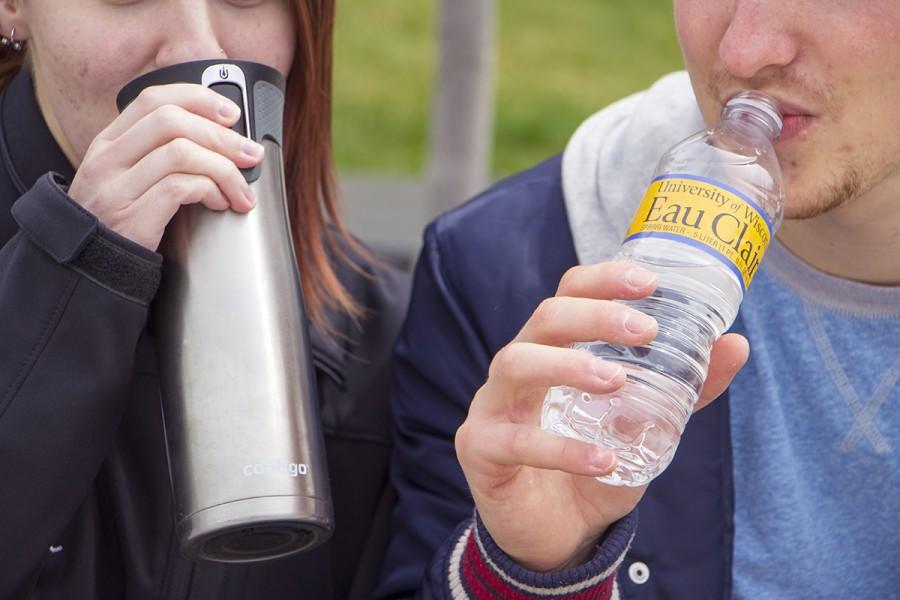Campus organization pushes students to buy fewer plastic water bottles
Unofficial poll shows UW-Eau Claire students support reducing the sale of bottled water on campus
More stories from Thomas Hensen
Photo by Kendall Ruchti
The Student Office of Sustainability is pushing UW-Eau Claire students to reduce their use of one-time use plastic water bottles after universities like UW-Stevens Point banned the sale of all plastic bottles on campus.
After other University of Wisconsin schools banned the sale of plastic water bottles on campus, some UW-Eau Claire officials are pointing the finger at students here for not caring enough about sustainability.
“(In Eau Claire) we can’t even get people to throw things into the recycling,” said Charles Farrell, director of University Centers. “I watched somebody just two days ago throw their plastic bottle into the compost bin … people don’t give a shit here.”
Unlike universities such as UW-Stevens Point, Eau Claire sells one-time use plastic water bottles on campus.
Stevens Point made the complete switch to aluminum cans in 2011, but Farrell said the comparison is unfair because Stevens Point’s campus culture revolves around the environment and sustainability. Farrell said the majority of students here just aren’t committed to the idea of a sustainable environment.
To gather student input, The Spectator ran an unofficial Facebook poll. Any Facebook account could access the poll, so some respondents may not have been Eau Claire students.
Of the 500 poll participants, 90 percent supported reducing the sale of one-time use plastic water bottles on campus, and 68 percent supported banning them entirely. According to the survey, 87 percent of participants already use reusable bottles on campus.
The plastic water bottle industry – with the exception of the two years following the 2007 recession – has grown every year since 1976, according to the Beverage Marketing Corporation, an organization that conducts annual research on beverage, food and consumer packaged goods.
Erik Amundson, the management intern for the Student Office of Sustainability, said Earth Week has kept SOS busy lately. They handed out free reusable water bottles and Cupanion stickers, which is part of a rewards program designed to encourage and promote the use of a reusable water bottle.
“We’re not forcing any students,” Amundson said, “we’re not taking away their water bottles.”
Farrell said Amundson met with him prior to Earth Week to discuss Cupanion. Although he likes the idea, Farrell said he’s not confident the program will be effective in converting people to using reusable water bottles.
“What I think will happen is that you will have a group of people who already regularly carry water bottles,” Farrell said. “(They) will be happy to take part in the rewards program.”
Philosophy professor Matthew Meyer said he got Amundson started on the bottled water reduction project his freshman year. Meyer said one of the main driving factors pushing him to work on this issue is the environmental effect of the plastic bottles.
Even if he disregarded the environmental implications, Meyer said he can’t ignore the potential health risks associated with plastic water bottles; in some cases, the plastic can break down into harmful chemicals that leech into the water.
But what bothered Meyer the most was the feeling of being exploited for something he considers free.
“They literally are selling ice to Eskimos,” Meyer said.
Meyer said he would be in favor of making the decision for the students and forcing them to adapt to a plastic bottle-free campus, but that it’s not necessarily the best solution.
He said he can envision a plastic bottle-free campus in which students don’t “allow companies to dictate how (they) consume beverages.”
“These types of movements won’t work without student involvement,” Meyer said.
Abby Reimer, a junior public relations student at Eau Claire, said she hasn’t bought a plastic water bottle since she wrote a research paper on the issue.
Reimer said she isn’t sure an immediate change is the best option.
“I’d say start out by lowering (the amount of plastic bottles on campus) and get people used to the concept,” Reimer said. “ … then we can get to an eventual place where there are no plastic water bottles around campus.”
Christian Wise, resident district manager in Eau Claire for Sodexo, said Sodexo would respect any decisions the university made regarding the issue.
“I don’t think students would be very happy,” Wise said. “But the decision about whether to not have water bottles on campus isn’t Sodexo’s.”


